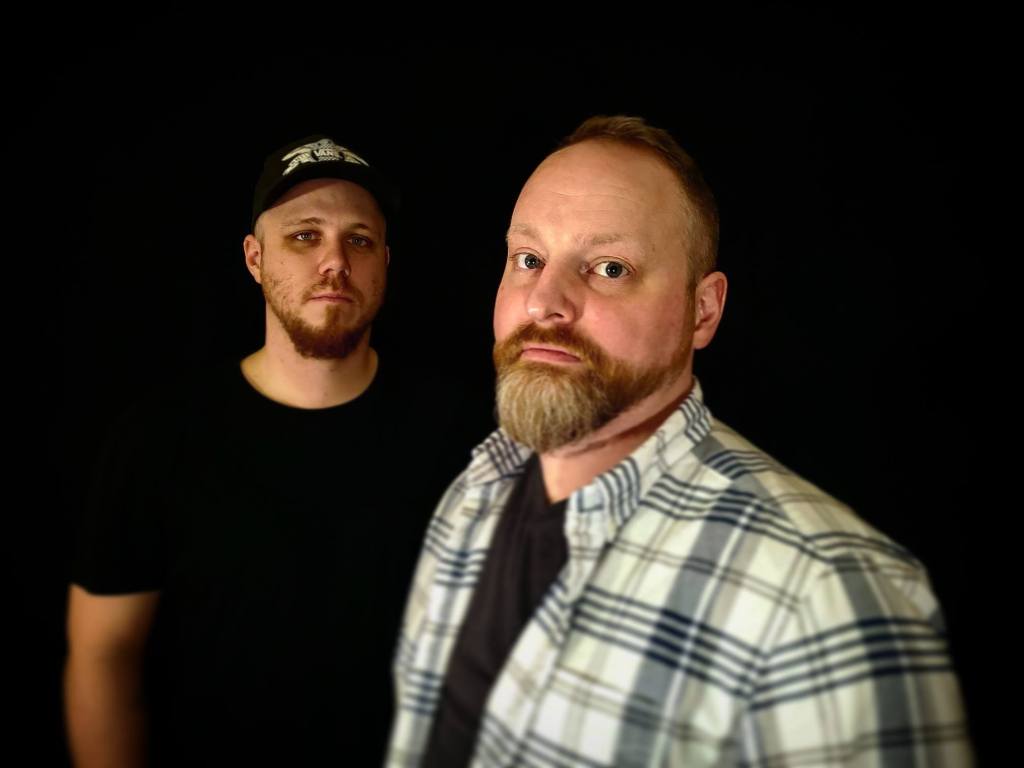
First off, tell the people who we’re talking to!
John: Hi, I’m John Ennis, lead singer of Qyn.
Chris: I’m Chris Feener, guitarist of Qyn.
Can you give us a bit of information about how the band formed? How did the two of you meet? What led to the decision to create a musical project and a full length album together?
J: Myself and Chris used to work together at Griffiths’ Guitar Works, and we became friends as a result of that. We came to find out that we shared a love of metal, and one night in the fall of 2009 Chris sent me a demo idea he’d started. I listened to it, gave him some suggestions on how I thought it could be expanded on further, and he refined it into a full song from there. Once the music was done, I wrote some lyrics and a melody for it, and we refined those. That pretty much became our process: Chris would write the music and main idea, and I’d write the lyrics and melody. Then we’d throw ideas back and forth until we were happy. After we had a few songs together, we decided we may as well try to compile enough to make an album.
Why did you decide to keep Qyn a two piece band rather than filling out the lineup to include other musicians?
J: I don’t think we really made a formal decision to keep it a duo, as much as it’s just how it worked out. We had many conversations about getting other musicians involved, but it just never seemed to come to fruition. Honestly, for me it’s always been something I wanted, but we never had the fortune of being able to commit to anything beyond a two piece. There were long periods of time where we never lived in the same community, and times when other life events had to take priority. During those times the music had to take a backseat, but even then it was simmering in the back of my mind. When we lived in the same places and had time, we’d work on it. We wrote as circumstance allowed, which made it a real labour of love. Bringing other people into that and expecting them to be committed to this album the way we were, it just wouldn’t have been realistic.
Is playing live something that Qyn wants to do in the future, in the post-pandemic world?
J: I’d love to. It’s a dream I’d like to someday become a reality, but we’d need a few more band members first.
C: Likewise. I’d love more than anything to take this music to the stage. From experience, there is no greater reward than performing your own music in a live setting. Especially when so much of yourself is represented in the music. Hopefully we can make it happen in the (not too distant) future.
When it comes to the music itself are there any other artists you can name as influences to your sound?
J: I think we draw from a lot of different places, but we’d probably both cite Deftones and Gojira as influences on our writing. In some ways maybe even Tool and Dream Theater.
C: The blend of my riffs mixed with John’s voice created something special, I think. I hear people comparing us to Protest (the Hero) a lot, understandably. There’s probably some Protest influence in there, somewhere, but the overall aesthetic just came more from the way we sound as musicians, individually, coming together. As John mentioned, those bands (he listed) definitely had a large impact on our direction, either directly or indirectly.
Speaking to John, who are your biggest inspirations as a vocalist?
J: I listen to a lot of different styles and draw influence from anywhere I can get it. For this project, I was certainly drawing inspiration from vocalists like Chino Moreno, Daryl Palumbo, Rody Walker, Spencer Sotelo, Maynard James Keenan and Devin Townsend. I definitely lifted a few stylistic approaches from Claudio Sanchez, too. I mean, not that I can sing like any of them, but they’re some of the vocalists who helped shape how I write in this style, and how I would approach my performances. But when I write I’ll draw inspiration from anywhere if it helps me get the ideas out.
Speaking to Chris, who are your biggest inspirations as a guitarist?
C: My biggest inspirations as a guitarist vary with regards to lead playing verses rhythm/riff-writing. Some of the guys who really changed the course of my playing as a lead player are John Petrucci from Dream Theater, Per Nilsson from Scar Symmetry and Jeff Kollman from Cosmosquad. While these guys are also riff-machines, some of the bands I gravitated towards more heavily in that regard are Gojira, Meshuggah and Deftones. (This is of course speaking only from a metal standpoint).
It took 11 years to release Archetype. I think I can speak for everyone in that the number one question we want to know the answer to is why did it take so long to produce and release this record?
J: I just think it boils down to both of us having a lot on our plates. I think we’ve both wanted this for a long time, but our interests and song writing styles matured and changed, so our direction for “an album” of sorts changed as well. Add to that the fact that we have both moved a lot the past few years for work and family, and other major life events, and boom, a decade flew by. We didn’t intend on it taking this long…
How has the reception been to your debut record?
J: Honestly, I have no idea. The feedback we’ve gotten is incredible, but it’s been a year of minimal socialization, so sometimes it feels like we’re caught in a bit of a social media feedback loop.
We have had some beautiful reviews and support from the local music scene media, some attention from college radio stations, and have had lots of kind messages from friends and family. The people who listen to it seem to like it, and we’re more than happy to have it in a final form and out in the world. I think Chris brought a lot of attention to the project in the past 11 years with his online presence, so part of our audience was already built in, and they were expecting the album.
C: It didn’t actually take 11 years to write. Cumulatively, it took substantially less time than that. Throughout the course of those 11 years, myself and John found ourselves living in different towns/cities and would write whenever our paths would cross or one of us wasn’t incredibly busy with other things, i.e. life, touring. We treated it more as a recording project where we could get together, have some fun and be creative. It just so happened that when I moved to St. John’s in 2016, we decided to get back at it and cross the finish line.
You’ve been nominated for the Loud Artist of the Year in the 2020 Music NL Awards. How does it feel to be nominated?
J: Blown away! We knew we were eligible to apply for nominations through Music NL, so we did. I never thought we’d actually be nominated, though. I think it’s fair to say we’re both proud of the album, so it’s nice to get a nod for the work we’ve put in from Music NL. The category is full of incredibly talented bands who we respect, so for me personally, I’m just happy to have been included among them.
C: It’s awesome! I’m super stoked that this is even a category, to be honest. It’s great to see heavy music getting some love in the “mainstream”. And the other nominees are incredible. So much diversity.
Now that Archetype has been out there in the world for a while, what’s next on the horizon for Qyn?
J: We’re not sure. We’ll keep writing together online, but we don’t really have a plan right now. With the limitations of the pandemic, and other life changes, only time will tell. Suffice to say the next album won’t take so long… maybe only 8 or 9 years. haha!
C: Once life settles down for me, we’re hoping to write the next one online, but take a bit of a different approach, musically. I’d like to focus more on groove and melody. We seem to hit a sweet spot in certain places on Archetype where I’m hearing something really special. I’d like to embrace that a bit more as a band.
Thanks for taking the time to speak to us here at Heavy NFLD and I wish you the best of luck in the 2020 Music NL Awards!
~ Akhenaten


